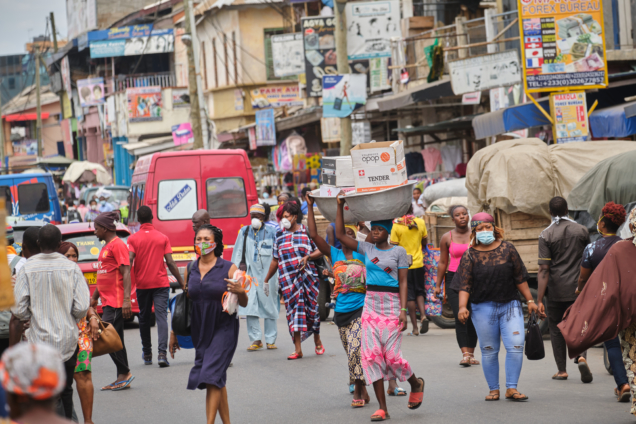It's been thirty days of serenity occasioned by an ancient ritual ordered by the gods, custodians of the land hosting Ghana's administrative capital, the Gas.
The ban on drumming and noise-making is an ancient ritual with far-reaching restrictions on dwellers of the land, whether natives or immigrants.
It may be one of the very few ancient decrees that have survived the so-called modernism on the continent of Africa, and so whenever the Ga state declares the ban, it is embraced with joy and jollity, particularly by persons suffering from phonophobia and other head conditions.

During the 30-day period of the ban, residents of the Ga state, irrespective of their residential status, permanent or visiting, are obliged to strictly comply with the prohibition on drumming and making noise.
The ban is extended to churches too.
Not even mobile preachers who spread the word through megaphones are given exemptions. Disk jockeys (DJs) are also banned from carrying out their trade, which is arguably the leading contributor to noise pollution. Also during the ban, tipper truck drivers are barred from needlessly honking within a mile radius.
The only group that has an exemption from the ancient decree is Muslims.
Muslims are given the exclusive privilege to carry out the call to prayer aspect of their five times daily prayers.
The gods have good reasons for the exception.
Noise pollution, though largely overlooked in this part of the world, has consequential effects on the health of those who deliberately or inadvertently expose themselves to it.
It disrupts sleep, causes hearing impairment, and stress. Some have even suggested that noise pollution causes high blood pressure and heart disease.

It's even worse.
Noise pollution has been identified as the main trigger of panic and anxiety among persons suffering from phonophobia (when loud noises can feel overwhelming and cause panic and anxiety).
The ancient gods of the Ga state may have taken a note of wisdom from their medical journal to decree and uphold centuries ago the ban on drumming and noise-making.
As someone still healing from the head injury I suffered in 2018 in the line of duty, which I guess is public knowledge, I always count down to the period and am always elated when it's in effect because the pub that sits adjacent to my house across the street, which denies me sound sleep on off days and weekends, religiously adheres to the order throughout the period, and I love it.
The problem, however, is that the moment the thirty-day ban is lifted, it is as though the noisemakers want to make up for all the days they were compelled not to make noise.

Pub operators, mobile preachers, and information centers/community radio stations try to reach their crescendo within the morning of the first post-ban day.
Some rascal tipper truck drivers needlessly honk on the streets just to show off and make up for the lost time.
Although Muslims are exempted from the ban and are allowed to call worshippers to prayers using their public announcement systems, some of the mosques out of reverence, tend to reduce the volume on their PAs. Some of them are quick to amplify to pre-ban levels when the ban is lifted.
As a non-Christian, I could tell that the energy level and enthusiasm of worshippers, particularly instrumentalists, on the first Saturday or Sunday after the ban in churches within the mile radius of the ancient decree goes a notch higher.
I can speculate and say that the drummers, having missed the drums for thirty days, were beating their drums harder and with much more energy than usual; and understandably so.

Because I could tell, sitting under the mango tree in my house, that the sound level of the instruments being played in the churches that surround my house was higher than the usual sound before the ban.
That said, if I were there in the days of old when the gods of the Ga state assembled to draft the decree on drumming and noise-making, I would have offered additional tons of cowries, eggs, local gin, and sprinkled more 'kpekple' to the gods to motivate them to look deeper into their medical journal. I am certain they would have found additional justifiable reasons to increase the period of the ban beyond thirty days to about a hundred days.
How therapeutic it would have been.
Latest Stories
-
Nominee for agriculture secretary completes Trump cabinet
1 min -
Betway Africa offers a once-in-a-lifetime ‘Play-on-the-Pitch’ experience at Emirates Stadium
51 mins -
The rise and fall of Matt Gaetz in 8 wild days
53 mins -
School Feeding Programme: Bono East NIB seizes smuggled rice, arrest driver
1 hour -
Dr. Razak Opoku: Despite challenges, facts and data still prove NPP is better manager of the economy than NDC
1 hour -
Seidu Agongo: On December 7, it must be peace over power
1 hour -
2024 Election will take place on December 7; ignore misleading claims – EC
1 hour -
GPL 2024/25: Asante Kotoko bounce back with win over Aduana FC
2 hours -
GPL 2024/25: Gold Stars beat Vision FC to retain top spot
3 hours -
Ebo Whyte returns with ‘The 4Play’
3 hours -
2024/25 Ghana League: Heart of Lions sink Legon Cities to go third
4 hours -
Bright Simons: DBG, Ghana’s top development bank, goes for the jugular
4 hours -
Governance and Entrepreneurship consultant demands global support for Africa’s young farmers
4 hours -
Ghanaians reminded to prioritise regular health check-ups
4 hours -
Salah brace sends Liverpool 8 points clear
4 hours

